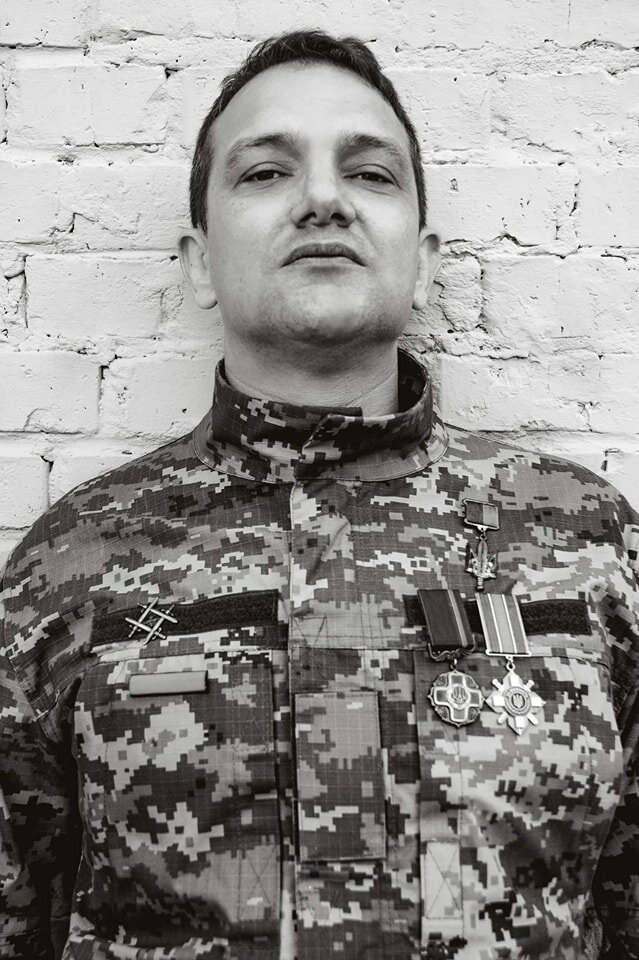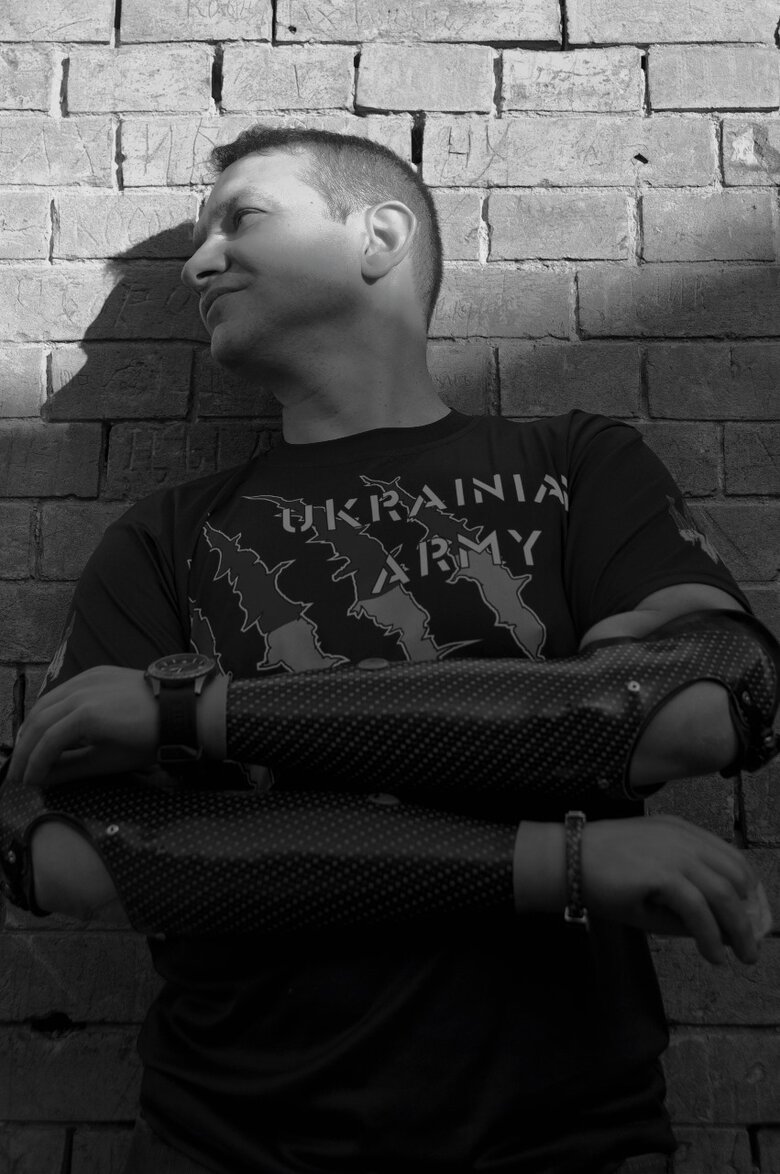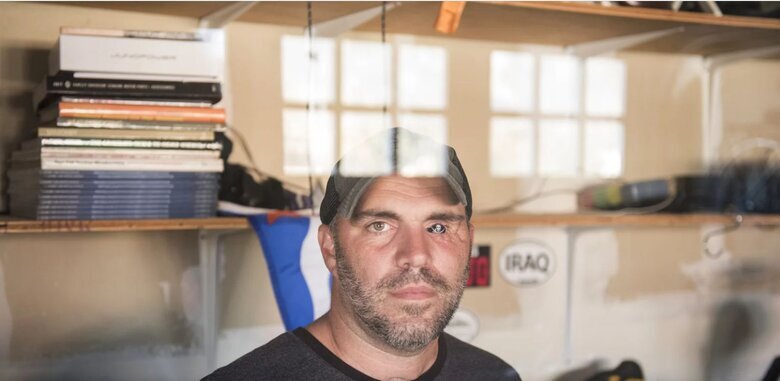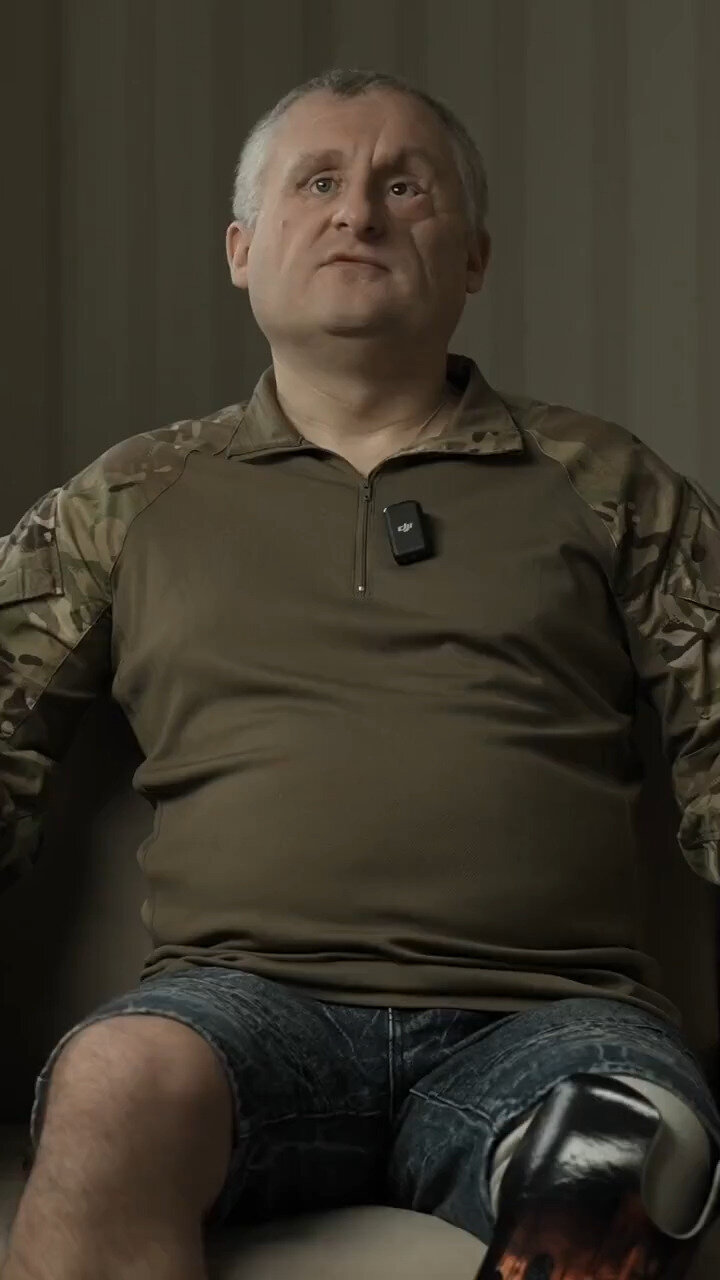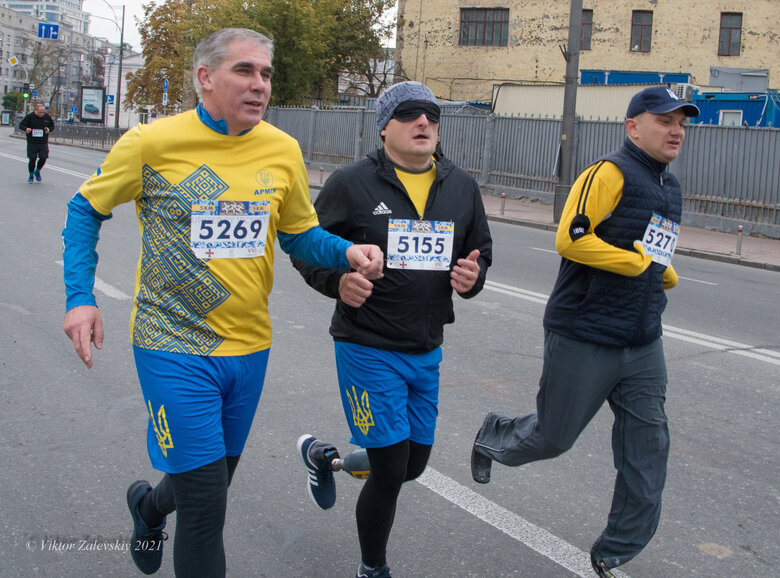People’s Hero of Ukraine Vadym Svyrydenko: "We want to create network of clubs for veterans. We want them to come to play football or volleyball, someone to use exercise equipment, someone to run."
People say about people like Vadym Svyrydenko: he is a legend. And they write books, or at least articles on Wikipedia.
In a few sentences, he has been fighting since 2014, took part in the battles for Shchastia and Debaltseve as part of the 128th Brigade. After being wounded and frostbite, he underwent surgery and lost his hands and feet. He learnt to walk on prostheses and use artificial hands, which were manufactured and fitted in the United States.
After an 8-month treatment in the US, he was rehabilitated in a Lviv military hospital, fully recovered, and can run and lift weights. In 2016, Vadym Svyrydenko represented Ukraine at the 41st US Marine Corps Marathon in Washington, DC, where he won the 10 km race. In September 2017, at the Invictus Games 2017 in Toronto, he won a bronze medal in the simulator rowing competition.
He was awarded the Order "For Courage", III class, the Order "People's Hero of Ukraine", and the Order of Merit, III degree.
Photo: Mina Sorvino
In recent years, Vadym Svyrydenko has been the Presidential Adviser on Rehabilitation of Combatants. In an interview with Censor.NET, he spoke about how the state and the veteran community see the rehabilitation and adaptation of wounded war veterans now and in the future. And what they are doing to achieve this.
- Vadym, we are talking to you on the eve of an annual charity event that will take place in Scotland. This is the ABF Cateran Yomp march of The Allied Forces Foundation. The Ukrainian team Iron Warriors, which includes acting military on prostheses and wounded soldiers, will take part in the event. You are the captain of the team. Tell us why this unusual event is being organized?
- Every year, the Ukrainian team is invited by the American veterans' foundation Allied Forces Foundation and Cateran Yomp from Scotland. Initially, this was invented to provide rehabilitation - psychological and physical. We understand that wounded soldiers are special fighters. At first, they fight for their health together with doctors to go through a difficult medical path to return. And then the question arises - what's next? And it is very good that we have such a programme in Ukraine - physical and sports rehabilitation - and back in 2016, the Americans offered us to take part in the Marine Corps march and then in Cateran Yomp.
We are gathering a team of wounded fighters. These can be both lightly and severely wounded. The distance depends on this. For a severely wounded soldier, it's 35 kilometres, for a lightly wounded soldier, it's 85. This is definitely not an easy distance, it's not just a simple walk on asphalt. Rough mountainous terrain, rivers...
- Are there any stops?
- There are pit stops. Because you can't go on and on, you have to keep an eye on the fighters. You know, in 2018 I already took part in such an event. It's actually very cool. You have to be prepared psychologically, physically and technically. We understand that you can't go out there without physical training. Because there are long, upward sloping, lengthy down. This is a specially selected course for people to prepare for. It's better not to delegate an unprepared person there, they will just fall off.
It is necessary that the prostheses are ready. If the prosthesis is rubbing somewhere, it will also be very difficult to walk. Or the dynamics are very weak. It is necessary to have the fourth and fifth degree so that the prostheses help and give impetus to the fighter to go this distance.
- "Buzkills" (a popular word nowadays) will start whining: why do they need to go to Scotland or the United States? What do they want to achieve?
- Back when the ATO/JFO started, we had some seriously wounded guys. And there was always the question of how to continue to raise them, what to do. Because everyone says that life does not end, but these are just words. We need to provide a mechanism for the seriously wounded to start working from the hospital. So that the guys could start recovering psychologically.
In this sense, we are an example. It is sometimes difficult for us: we need to change the system, the approach to prosthetics and psychological training. We need to constantly show that every fighter has and can find that core in himself. Because he went through the war and should be an example for others and for his family.
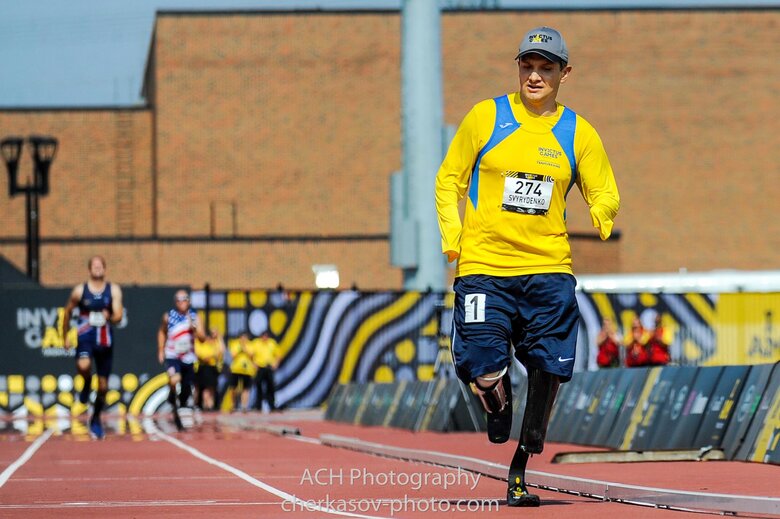
Thus, looking at the injuries, we find certain opportunities for recovery in sports. It is not limited to athletics. It can be football, small arms, archery. And since 2018, we have offered long-distance running as a method of recovery. We have guys who have never run marathons running 42 kilometers. After being wounded. Everyone chooses options for themselves according to their abilities, according to how they set themselves up, and then they choose a distance.
- In Scotland, I understand that there will be a higher degree of complexity.
- That's why we select the guys... They are all paratroopers, or Special Operation Forces, or border guards. They all have amputations, but they continue to work out physically. So they have to be ready.
Why are we doing this? In fact, this is very significant, because in such competitions abroad we solve several issues at once. Firstly, the guys are pulling themselves up again, becoming even stronger. Secondly, we show the world that the war is still going on - and we don't need to tell them about it. Our prostheses speak for us. We have evenings where the military can communicate. There are also veterans from other countries, military men. They come back to their countries, meet with other military men, with politicians and tell them that the war in Ukraine is ongoing.
-This is true, because in the United States, for example, veterans are very integrated into politics. They influence the agenda of politicians. In our country, this is currently almost zero.
- I will say more: such meetings help us improve prosthetics and all kinds of projects in Ukraine. We meet with veterans, see what kind of prostheses they have, listen to their programmes, what they have. And we are already bringing new projects and new prostheses to Ukraine.
- How many people are in your team?
- As of today, there are 11 people. These are 7 people on prostheses, two lightly wounded and two escorts. There should be an escort at the event. Although we have special chips there, we check in on the pit stops. In other words, it goes to the general system that we are moving, we are going. Because if we stop somewhere, an ambulance comes to pick up the soldiers.
In general, the distance can be covered in 24 hours. 35 kilometres can definitely be covered in about 7-8 hours. And the full distance of 85 kilometres takes a day. That is, the guys go for a day without stopping. At the pit stops, they can only eat some chocolate, drink something, tea, water.
- In addition to the goals of the event that you have already mentioned, have you set any financial goals for yourself?
- Absolutely. We understand that today the main task of the state and everyone who cares about our veterans is to get them back on their feet, to inspire them into action and walking. But we have a lot of young guys who want to be as fast and as persistent as they were before the war. They want to run, to be an example. And we want to raise money for them for sports prosthetics. Our state actually funds this, but we understand that this money is not enough.
- How much do you want to raise?
- The goal is £100,000. If it is more, we will be only too happy. Every pound will be donated to a veteran to help him or her get a sports prosthesis.
- You are the Advisor to the Presidential Commissioner for Rehabilitation of Combatants. You have been involved in this on a full-scale invasion. Don't you sometimes get scared because the scope of your work is expanding every month? Because the number of heavily wounded and lightly wounded is growing.
- We felt the complexity of the situation when the full-scale war started. At that time, the country was encircled. We were surrounded and had to defend ourselves. The enemy attacked us with planes, tanks and helicopters. The number of them was incredible - and I realised even then that the number of wounded would increase by thousands. That's why we sent letters to all departments and ministries from the very beginning because we had to be prepared and transfer funds to meet the needs of the wounded.
- There was such a need, but in the first weeks of the war, hardly anyone answered you.
- The tasks were different, you know? But within a couple of months, we saw the number of wounded, where they were and that they needed help. We went to them, gathered 40-50 people each, and provided primary psychological assistance. We told them about prosthetics, their types, and about government programmes. This had a great impact on their psychological state. We helped them with documents...
- Indeed, personal experience in such a situation is a powerful positive factor. It's one thing to have a civilian, even a good one, psychologist, talk to a despondent, seriously wounded person. And it is quite another when a wounded man listens to Oleksandr Darmoros, a military psychologist with an incredible story of overcoming his injuries...
- The Equal to Equal program has been working for a long time, but it is not being finalized in some places. Therefore, this program should definitely be revised. Because we have a lot of wounds that were not there before the full-scale invasion. Loss of vision, and amputations are very complex injuries.
- In addition, in this war, according to statistics, it is not bullet wounds that are leading the way, but shrapnel wounds. Mines, shells, rockets.
- I do not divide them into mines and shells. I divide the guys more by injuries. These are injuries to the central nervous system, traumatic brain injuries, spinal cord injuries, and amputations of internal organs. This is more important for me. Maxillofacial injuries, for example. I clearly understand which specialist to contact, what kind of help to provide to the soldier, what kind of support, i.e. a route. Now it is changing. Today, rehabilitation has also changed a lot, it is growing. The number of rehabilitation centres has increased; surgeons who have already worked with such severe injuries work there.
We are developing, but the war is not over. Every day we face new challenges, new wounded. We go there again, study and make adjustments.
- What does the work of the Advisor to the Presidential Commissioner for Rehabilitation of Combatants look like in real terms? What does your typical day consist of?
- Every day I need to find these areas that our ministries have not worked out; point out these gaps to them so that they close them, and control these processes. But I can't just sit back and watch. That is why I am constantly travelling around the country, attending various meetings. I visit our veterans, I have my own primary care programme.
I don't just go to the establishment and point out their shortcomings, I also gather the guys and tell them all about it.
- Do you have supervisors from the President's Office and relevant ministries?
- I have my own supervisors who monitor my work and to whom I report on my work. If the ministries do not hear me, I can draw their attention to help resolve a particular issue.
- During the years of the full-scale invasion, did you have a detailed conversation with President Zelenskyy?
- Today he is constantly at work, on the run. That's why, at first, there are more official reports that are being studied.
- And someone tells him all this?
- Yes. But in case of big complexity, I meet with him personally.
- Do such meetings happen?
- Absolutely. But they are not disclosed.
- When talking to him, did you feel that he was up to speed?
- If he was not up to speed somewhere, I have to explain the issues. This is our job, to find the issues that are not covered; to tell them what the problem is, how they tried to solve it and why it has not been solved yet. And to come up with an understanding of how to solve it.
- Do I understand correctly that your meetings went according to the following scenario: he asked what he needed, asked questions, and you answered?
- Firstly, he is always interested in various issues. When we meet, I immediately tell him what I came with. I collect all the questions in advance to tell the whole picture of the wounded. Actually, I mostly work with the seriously wounded, but I can also talk about the situation with family members of the dead and captured. And, of course, not only I report, but everyone who works on these issues. Because it is clear that everyone needs to address the issues - not just one ministry or agency. If someone says that I alone can solve this issue, it is not true. This cannot be solved alone. Therefore, all relevant ministries must provide their vision. And prove financially that it can be solved, that the country will lose less. Although some areas require large financial expenditures.
- So you are satisfied with the level of cooperation with the state?
- This is a constant work in progress. The main thing is that people are satisfied with the state. We do not hold these positions for life. If we manage to do a good job, I feel an inner satisfaction. If someone says "thank you" to me for this, we have definitely done our job right.
- My colleagues and I write so much about problems, but sometimes it's worth talking about achievements. What do you see as your and your colleagues' main achievements?
- Our achievements include, for example, new types of prosthetics in Ukraine. This is the provision of primary psychological care. Not all of our psychologists are actually able to provide primary psychological care. This is a programme to help our captives who are just returning from captivity. The number of captives is very large and they are also returning all the time.
There are programmes that are constantly being improved. These are our palliative care areas - there is a huge problem of what to do with our guys who have suffered, for example, brain injuries and will be bedridden for life.
- How many such people are treated in Ukraine and abroad?
- Sometimes hundreds, sometimes thousands, depending on the injuries. And they now need new nursing facilities. This issue is now being raised at the presidential level.
- Many of the severely wounded are currently being treated abroad. Does this mean that we need to focus on foreign experience, on examples of countries where it works like clockwork? Or are there no analogues in our war, including in medicine?
- You said the right key word: at war. No country can say that it has such fighting and such traumas. Because they are combined. We understand that many fighters, when they lose, for example, limbs, suffer shrapnel injuries, brain injuries, contusions - and nowhere else is there such extensive practice. We now have projects where foreign doctors come to us and bring us projects. We collect this from all countries in one place, in one state, and create a system. And it's the right thing to do. Indeed, at first, we sent a lot of fighters abroad. But the real result was shown when doctors from other countries started coming to us. They came to train our doctors here, on the spot. And it was on the spot that we started providing full-scale medical care.
- It is easier logistically, and the native land often heals better.
- Absolutely. For example, if we send five doctors abroad, what will we teach them? But here we can gather 50 doctors, conduct training, show surgical operations...
- ...and then we have a powerful proportion of people who will go to medical stabilization points and clinics with extremely useful knowledge.
- They are gathered from all over Ukraine. They are the Medical Forces Command, civilian hospitals, leading surgeons, and they are taking on surgical responsibility. They take care of this issue. And then there is the issue of the post-surgical, medical part. There is rehabilitation, multi-stage recovery. We now have many very cool rehabilitation specialists and surgeons. The most important thing is not to stand still, but to develop.
- Please name 2-3 indicators on basic benefits and amounts provided by the state to seriously wounded.
- The state has difficulties, but it provides prostheses for the severely wounded. Before the full-scale war - in full. We did not apply to any fund.
- Is it more difficult now?
- It is difficult. The economy is collapsing. All prosthetic plants have raised their prices. The state provides, but there is a need for additional funding. We have two resolutions in place: 321 і 518. 321. This is like primary prosthetics. It is not as complicated, less funded, but there is triple funding compared to civilian prosthetics.
For example, for a leg above the knee - UAH 860 thousand. This is for primary prosthetics; this is where the foot is still at, for example, the third mobility level, the knee is not so complicated. But when Resolution 518 comes into force a year later, it's already over 2 million.
- Is there any data on how many people have used what they are entitled to receive from the state under these conditions?
- Let me give you a percentage. All foundations raise money, and we hear from these foundations. But this is 7% of 100, the rest is closed by the state. You understand that these are not small amounts.
- If the quantity is more or less normal, then the quality of the prostheses can be a serious issue. No?
- If we had a war now, I would say: yes, the Soviet Union. But our war started in 2014. Everyone forgets about it. And prosthetics began to develop in Ukraine from that period. Thank God, we rejected the Soviet Union then. The guys went abroad and started bringing back new types of prosthetics. We got bionic hands in 16. And this is funded by the state. The degree of our foot is at the 5th level, and this is a very high dynamics. And again, I want to remind you about sports prosthetics. Not all countries have it, and this is our achievement.
- Do you know what the most picky readers will say? He "sings" too much about his achievements. Like a nightingale...
- Look at me.
- A warrior's answer. Nevertheless...
- Okay. Then I'll say this: read our legislation, resolutions 321 and 518. It clearly states what kind of prostheses our soldiers are provided with. If these prostheses are prescribed in this legal framework, it means that the state pays for them.
- Great, so theoretically the legal framework is fine. And then the state bureaucracy begins, and then the human factor begins. Stupid, indifferent officials. The same blind military psychologist, Oleksandr Darmoros, told me about his own traumatic experience and that of his wards. He told me about the feeling of rage and helplessness that suffused him when officials brazenly denied him what was guaranteed by law.
- Sasha faced the following problem...
- Is there anywhere for seriously wounded soldiers to apply in such cases?
- Yes. The Medical Forces Command has a hotline and it works. There is the Ministry of Social Policy. And there is a fund to which you can apply with statements that you have been spoken incorrectly, that you did not know the law, or that some separatist is doing it intentionally.
You can also contact me. You can write to me on the same official Facebook page. A special person answers all calls, and we resolve such issues. There are legal departments. Finally, there is the Ministry of Veterans, which has its own legal department and branches in each region. You can also ask for help there if someone has been treated incorrectly and the issue has not been resolved.
- One American veteran told me the following: in our country, he says, psychologists are on duty at every major war memorial. Why? Because, according to statistics, a certain percentage of suicides among veterans occur after traumatic visits to their fallen comrades. After all, everyone perceives such communication with graves differently.
I thought at the time: how well they had thought through such things to the smallest detail. This is, of course, also because the country was at war - in Korea, Vietnam, Iraq, Afghanistan. And they analysed their experience, which was sometimes very bitter. When will we have such a thoroughness of care for our war veterans?
- In fact, we have gone further than the Americans. We think through everything. We studied their experience, studied the experience of the ATO. Indeed, such complicated cases become more frequent about two years after the war. After participation in hostilities. It really hits you then.
Today, we are developing a system - from the ministries of social policy and defence to local communities - to ensure that the entire path a veteran takes from returning home from combat is under control. We are implementing the basic model in the Rivne region, where we train social managers. These are people from veterans' units and families of the fallen who want to help veterans. This becomes their life; they monitor each veteran and their condition on site. They communicate with the family. In higher education institutions, they are taught how to provide real psychological assistance; these people become specialists in the field; they understand how to communicate with a particular veteran, and when to contact the right specialist to help him or her.
A separate issue is when a veteran addresses the Ministry of Veterans, a branch, or a council with a question. It is the failure to resolve the issue that leads to such nervous breakdowns. In no case can we say: 'We can't do this, go away. Instead, we say: okay, we'll think about it. Even if we don't know what to do yet. We will look for ways to solve these issues and take control of this veteran. But this is not the case in America. There are veterans' organisations where a veteran actually registers, but the organisation doesn't know whether he or she comes or not. In other words, they expect veterans to come to them. And we are building a system so that if a veteran does not come, we go to him or her. This way we reduce the number of suicide cases.
- We can already see such everyday scenes where confused civilians do not know how to communicate with a wounded veteran. For example, he has prostheses or a disfigured face. And adults, civilians, look away, turn away. They ask themselves: how should we behave? What should we say?
In my experience, children behave best in such situations. Sometimes they approach veterans with a defiant interest - but sincerely and without the shadow of psychological complexes or hypocrisy.
- Can I tell you a funny story? We once were present at an event. Among other things, there was a dance project, and our veterans on prostheses were dancing. And there was a girl standing next to me. We started talking, and she began to tell me that she was scared, that she didn't know how to communicate with a veteran. And I told her: sometimes you talk to a veteran without knowing that they are a veteran (because they were in uniform, and I was in civilian clothes). Then I left, and she was surprised that it was possible to communicate with a veteran, that he was just an ordinary guy who had just been through wars. His thoughts hadn't changed. Yes, the war has "beaten him up". But he is the same person.
- Not an alien.
- He is not an alien at all. I would put it this way: on the one hand, you should treat a veteran as a human being but don't just intrude on his or her feelings. Because not all veterans can tell a civilian, a simple ordinary person everything that is inside them. He will tell another veteran or someone he trusts.
- Another friend of mine, an American veteran, D.J. Skelton, lost an eye in the war, among other injuries. And so, being a man of strong spirit and a bit of a mischievous sense of humour, he inserted a replica of the pirate Jolly Roger into the lost eye.
And so when a person sees this Roger and even a smile from ear to ear, he understands: there is nothing to be afraid of with this person, he is open to communication!
- Absolutely. We are still educating our society. We have to educate it. Nowadays, a lot of guys are actually wearing shorts, showing their prostheses, not being afraid. And I will tell you that humour is our everything. We need to treat many difficult things with humour. It helps a lot to overcome existing barriers psychologically.
- The other day, I attended a screening of the documentary film Standing Our Group by Kostantyn Klyatskin. It's a film about the sense of humour at war. I highly recommend it to you and all our readers: this is how soldiers of various branches of the armed forces - tankers, medics and special forces - talk about the war and themselves at war. And all of this is funny, but not in a Petrosian way, with reflections, deeply, dramatically...
- Good. And I recommend you to watch the film Life After Tomorrow, which we made before the full-scale invasion. It's about the lives of two veterans - mine and Oleksandr Tereshchenko's. Oleksandr lost two arms and an eye. How we adapted to life, how we worked, how we play sports. Everyone talks about their lives, how they cope in everyday life. If you watch the film, you will definitely not be able to collect your wits. We recommend even our veterans to watch it because it is also insightful. It's adapted, it's insightful, so... watch it and then tell us about it.
- But let's get back to the topic of veterans' rehabilitation. Another veteran friend of mine in the US is the head of one of the hundreds of American sports clubs that rehabilitate the military. And their rehabilitation profile is unusual - mountaineering and wall climbing.
- They came up with a very cool idea. We have just come up with this idea and now we want to create such clubs. Somewhere they already exist, but perhaps not on a large scale yet. Because our country is still at war, and a lot of soldiers are still there. Some of those who have served in the ATO/JFO are involved, but most of our veterans are still in rehabilitation centres and medical facilities. We really need to create a lot of different clubs so that veterans can come, talk, and find something for themselves. These are now called 'hubs'. They already exist, but my comrades and I want to create such sports clubs, a whole network. We want them to come and play football, some to play volleyball, some to use the exercise equipment, some to run. It should be a dynamic. We have seen how dynamics can lift the human body and spirit. Sasha Darmoros, for example, we also helped him through athletics.
- Yes, and he told us about it in an interview.
- Now you can't pull him out of it. Back then, he had a running prosthesis, and we suggested he was engaged in. And what a result he showed three months later when he was already running 10 kilometres! And now we need such clubs - not just running clubs, but clubs for different sports. We need mountaineering and cycling - all sorts of things.
- One thing I'm interested in is how to take to the assembly line in terms of sponsors. Who should finance it?
- Today we are already developing this. First, there are federations. Many of them are already involved, each creating its own programme. Our veterans will be involved in these federations. We want each federation to have its own branch in each city and give veterans the opportunity to go there.
- Which federations are currently setting an example in this regard?
- Athletics Federation, Strongman Federation, Archery Federation.
- These are the top three, and the rest are get involved, right?
- Yes. You can see it even in the competition. If we look at athletics, in addition to internal and external competitions, we have a well-developed training process that is still in place.
- Will our country ever have comprehensive hubs for veterans like the United States? With gyms, football and baseball fields, and a sauna and a bar to sit in?
- Wait, wait, we are at war. Let's start with that.
- We are trying to look ahead a little bit.
- We want to do as much as we can, as far as we can. But, for example, we can't gather in large groups at the same stadium now, because it's forbidden. We gather and train in parks where possible. We used to train at the central stadium; we had time allocated for free, coaches. We would come and spend two hours on a cool sports ground. Sometimes we had groups of 80 people.
- Yes, and now if 80 people gather, the police will come, and with reinforcements.
- That's why we have this project: we are thinking about how to create clubs. We are currently working out the issue with the federations. I think we will soon have good sports halls for veterans. And I'm not talking about sports of great achievement. For me, this is sports rehabilitation. At first, a person suffers an injury, recovers, reaches a certain level and becomes a champion. Because having overcome his injuries, he recovered and achieved victory over himself. Let it be an hour, but he will go that distance. He could have just laid down - but he found the strength, recovered and achieved this result.
Attention! Anyone who wants to support Vadym Svyrydenko's team in its lofty goal of raising £100,000 for sports prosthetics for our fighters can donate here:
Jar in UAH https://send.monobank.ua/jar/3Y7evohaZj
Donate in pounds https://www.justgiving.com/page/ironwarriors
Yevhen Kuzmenko, Censor.NET
PHOTO: Vadym Svyrydenko's archive; Mina Sorvino

